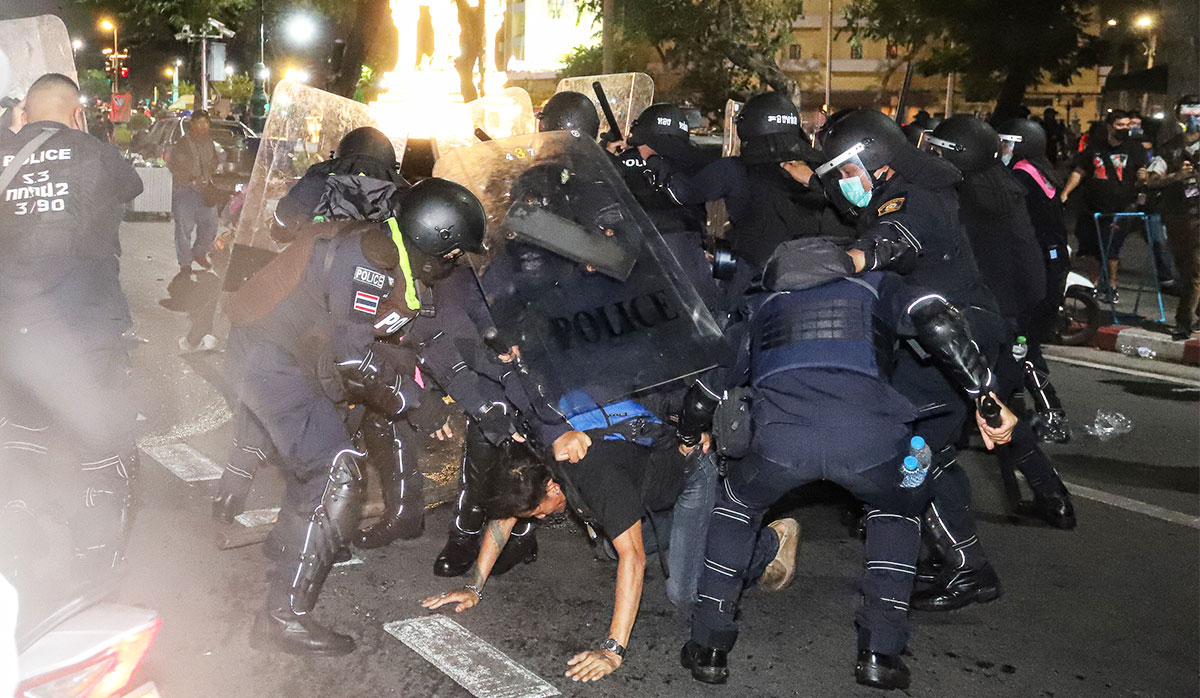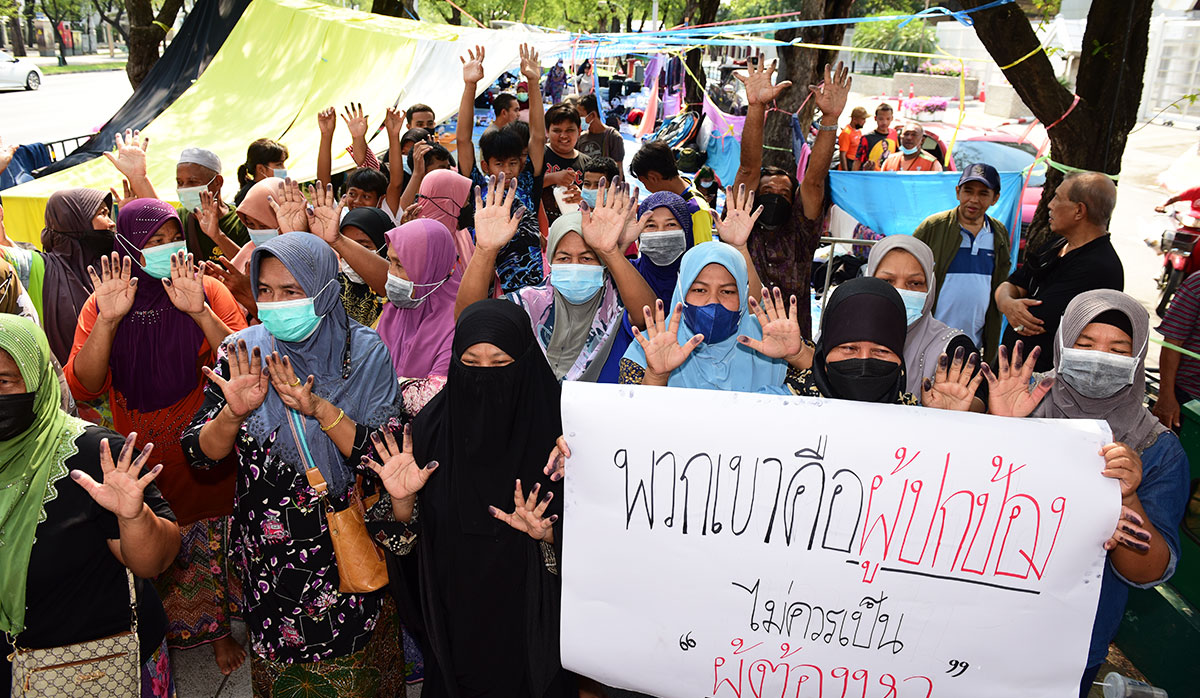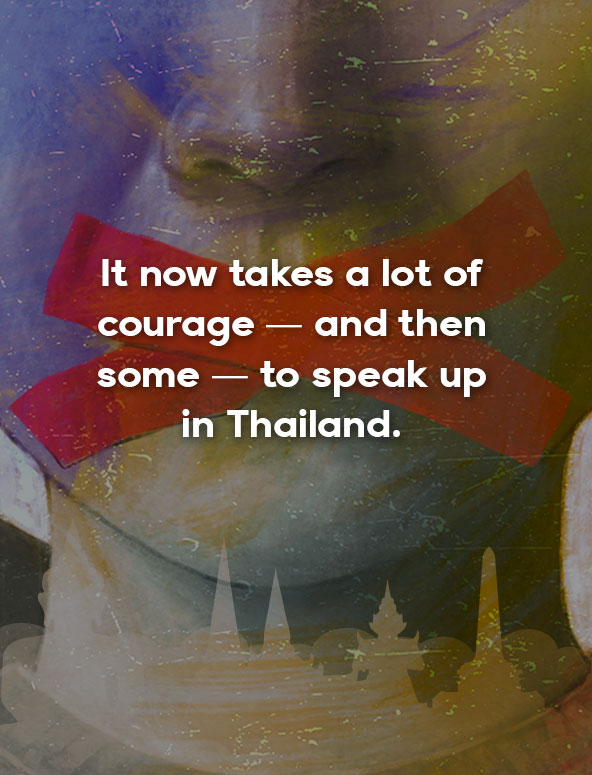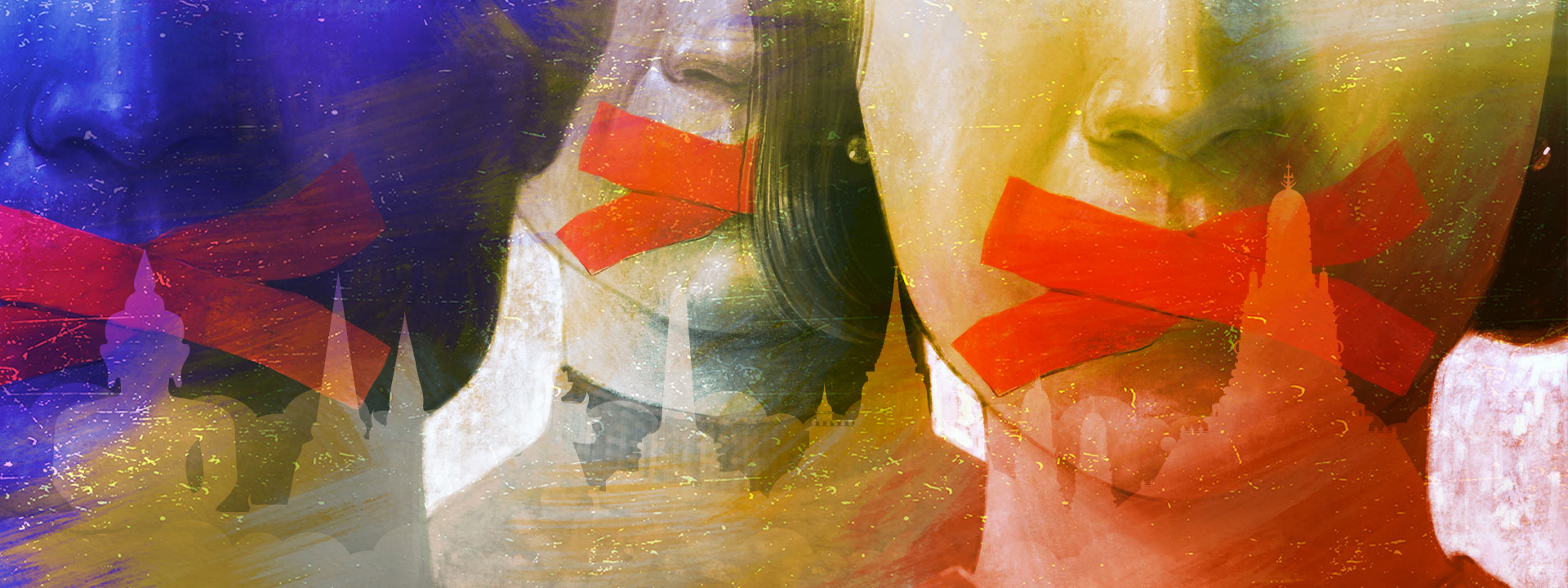Thailand’s civil society is at risk of being paralyzed after the government last year deployed several legal instruments in a bid to curb, if not stop, its initiatives and activities. Although lawfare has long been part of the Thai government’s arsenal, it stepped up its use of the tactic late last year, targeting not only its visible critics but also institutions that it perceives as helping those seeking change in the country.
In early November, the Constitutional Court ruled that the already detained monarchy reform movement leaders aimed to overthrow the monarchy through their speeches and protests, and ordered all similar moves stopped. The broadcast media regulator, the National Broadcasting and Telecommunication Commission, then told broadcast media not to interview monarchy reform protesters at length and to avoid presenting a debate of the controversial lèse-majesté law. This was even as 167 people were being prosecuted under the law, according to the Thai Lawyers for Human Rights Group, which represents most of them.
An attempt to pass a law to regulate and possibly restrict some activities of non-government organizations (NGOs), as well as their funding, was also initiated last year and is still ongoing. Then there’s the bill proposing the establishment of a state-funded Media Profession Council, which was eventually given a green light by the Cabinet just this January.
While no one in Thai civil society is waving the white flag just yet, several of its members admit that these developments are already having significant impacts.
One prominent activist, for instance, says that after the Constitutional Court released its ruling last Nov. 10, some organizations and individuals who had, until then, openly sympathized with or expressed support for the monarchy reform movement are now assessing what they should and can do next, given the odds stacked against them.
“It impacted many NGOs, including foreign ones, and some groups, and made them rethink whether they can continue or should openly support (the monarchy reform protests and movement) or not,” says the activist who requested anonymity.

Anti-riot police officers pin down a protester during a pro-democracy rally in Bangkok in March 2021.
Control and squeeze
Pornpen Khongkachonkiet, a veteran NGO leader and director of the rights group Cross Cultural Foundation, says that the draft bill directed at NGOs is the government’s attempt to restrict the kinds of activities that are permissible under the law, as well as to control the organizations’ funding pipeline. The draft bill received a nod from the Cabinet on Jan. 6, 2022.
“They may restrict certain types of activities, say, organizing a public forum to criticize the military,” says Pornpen. “They don’t have such a law yet.” She adds that if the bill is passed, the NGOs Operations Act could require NGOs to submit their activity plans for the government’s approval in advance to ensure that “public order” and “good morals” are not affected.
The problem is that what constitutes “good morals” for the state may be the suppression of human rights or limiting critical activities by NGOs. With issues such as monarchy reform already being yanked out of the public discourse, observers say that activities and initiatives concerning matters such as the Thai-Malay Muslims’ fight for self-determination in Pattani in the country’s deep south, capital punishment, and mega projects that adversely affect the livelihood and rights of local grassroots — all of which merit open discussions and debates — may be deemed as inappropriate or a threat to national security.
There are worries as well that the draft law could squeeze or restrict the NGO’s funding from overseas, leaving some of the organizations dry or even dead. The government’s “usual suspects” include the Open Society Foundation (OSF), one of the largest philanthropic foundations in the world. OSF has funded many Thai NGOs, including those working on the rights of the Thai-Malay Muslims in the southern province of Pattani and pro-democracy news outlet Prachatai, which is critical of the monarchy and is against the lèse-majesté law.
OSF has been quiet so far about the issue. The Foundation, however, is regarded as a Trojan horse of the United States’ neo-liberal interests by Thai conservatives and supporters of the Prayut Chan-ocha government.
Pornpen says, though, that the draft law, if passed, will likely be used to control only the NGOs seen as being anti-government or against the state. “It will be used to control just a few NGOs — not all,” she says. “But the general picture is that it will restrict anti-government expressions, public assembly, and affect democracy in terms of participation.”

In December 2021, residents of the Chana district in Songkhla, one of the southern provinces in Thailand, protested the conversion of their agricultural lands into an industrial zone.
Press drops the ball?
Just a few years ago, these developments would have been the subject of many stories in the local press. But as democratic space in the country shrinks, much of the Thai media have taken to practicing self-censorship. The global media watchdog Reporters Without Borders even noted in its 2021 World Press Freedom Index, “The coverage or non-coverage of the massive pro-democracy protests in 2020 confirmed the scale of self-censorship within the Thai media.”
The fear is that with the National Broadcasting and Telecommunication Commission’s recent directive putting the Thai media in an even tighter bind, journalists may now feel even more compelled to look the other way instead of covering issues that the current government deems as “sensitive.” Foremost among these is anything on or about the monarchy. For sure, though, it may be hard for the media to impose any more censorship on themselves on this, considering that they have been avoiding anything even mildly critical of the king, and have imposed a total news blackout on his activities whenever he is in Germany.
To some, the Thai media have not only dropped the ball; many of them have scampered away. In a piece posted on her publication’s website in November 2021, Thai PBS World Deputy Editor Hathai Techakitteranun wrote, “Journalists have a duty. We owe it to the people to report what is going on and present all the facts and opinions from all sides. This means that no issue, unless it is endangering someone or violating their privacy or any other basic right or freedom, should be off-limits, when handled in accordance with all ethical standards, of course.

“A free press, which is essential in any democratic society, means a free society,” she also said. “A press living in fear means a society living in fear. Media freedom is not just about the media. It affects the freedom of speech and the rights to information of all of us.”
To be fair, it now takes a lot of courage — and then some — to speak up in Thailand. For many, what has happened and is happening to the youthful members of the monarchy reform movement is acting as a deterrent: Some of its leaders have been denied bail and are in detention awaiting and/or facing trials. Members of the movement who have been released or were not even detained but charged or indicted are suffering from stress, with some unable to find jobs.
Benja Apan, for instance, spent three months in prison before being released in the middle of January 2022, under the conditions that she would not join protests and must remain inside her residence between six p.m. and six a.m. A university student activist and co-leader of the monarchy reform movement, Benja must wear an electronic monitor on one of her ankles all the time. This has basically made it impossible for her to play an active role in the movement — at least when it comes to protesting on the streets.
Jatuporn Saeoueng, for her part, says that no one wants to hire her as a cook — her profession before she joined the monarchy reform protests in early 2021 — because she has a royal defamation charge and because she has to go see the police and the prosecutor, and eventually the judges, every now and then.
According to the 25-year-old, she has been unable to find work for a year now. “I can’t find work since I have multiple charges,” she says. “When (the potential employers) learn about the charges, they dare not hire me. This is not just a feeling. I have applied to four or five places and they told me to clear up (the legal charges) first.
“It’s very difficult to plan,” Jatuporn says. “Life is very difficult.” ●
Pravit Rojanaphruk, a long-time advocate of press freedom, is a columnist and senior staff writer at Khaosod English.



















